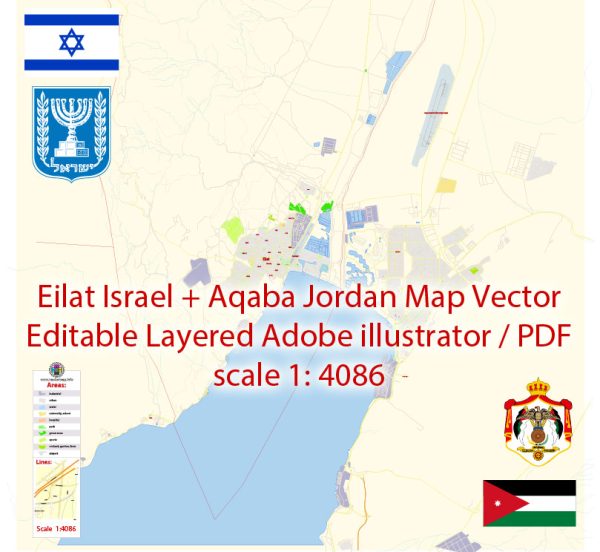Eilat, Israel, and Aqaba, Jordan, are neighboring cities located at the northern tip of the Red Sea. They share a complex and intertwined history due to their geographic proximity and the broader history of the region.
- Ancient History:
- Both Eilat and Aqaba have ancient historical significance. Eilat, known in antiquity as “Ezion-Geber,” was an important port for the Kingdom of Judah, serving as a key trading post for goods transported from the Red Sea to the Mediterranean. Aqaba was known as Ayla during the same period and played a role in the ancient spice trade routes.
- Ottoman Rule:
- During the Ottoman Empire’s control of the region, both cities were part of the Ottoman province of Hejaz, with Aqaba being more significant due to its strategic location and harbor.
- British Mandate and Post-World War I:
- Following World War I, the British took control of the area that includes modern-day Israel and Jordan, and Eilat and Aqaba fell under their influence.
- 1949 Armistice Agreement:
- After the Arab-Israeli War of 1948, Eilat was transferred to Israeli control as part of the armistice agreements between Israel and its Arab neighbors. Aqaba, on the other hand, remained under Jordanian control.
- Post-1967 War:
- During the Six-Day War in 1967, Israel gained control of the Sinai Peninsula, including Eilat. However, it returned the Sinai Peninsula, including the town of Sharm el-Sheikh, to Egypt as part of the Camp David Accords in 1979.
- Peace Treaty and Economic Cooperation:
- In 1994, Jordan and Israel signed a peace treaty, establishing diplomatic relations between the two countries. This treaty led to increased economic cooperation between Eilat and Aqaba, including the construction of a joint Israeli-Jordanian industrial park and free trade agreements.
- Tourism and Development:
- Both Eilat and Aqaba have become popular tourist destinations in the region, drawing visitors with their warm climates, Red Sea beaches, and diving opportunities. The cities have seen significant development and investment in tourism infrastructure.
- Geopolitical Context:
- The history of Eilat and Aqaba is closely tied to the broader Israeli-Arab conflict and the evolving political dynamics of the Middle East. While they have experienced relative stability and cooperation in recent years, the overall geopolitical situation in the region continues to influence their relationship.
In summary, Eilat, Israel, and Aqaba, Jordan, have a shared history marked by trade, conflict, and cooperation. The peace treaty between Israel and Jordan in 1994 has paved the way for increased economic collaboration and the development of these neighboring cities as vibrant hubs of tourism and trade in the region.


 Author: Kirill Shrayber, Ph.D.
Author: Kirill Shrayber, Ph.D.